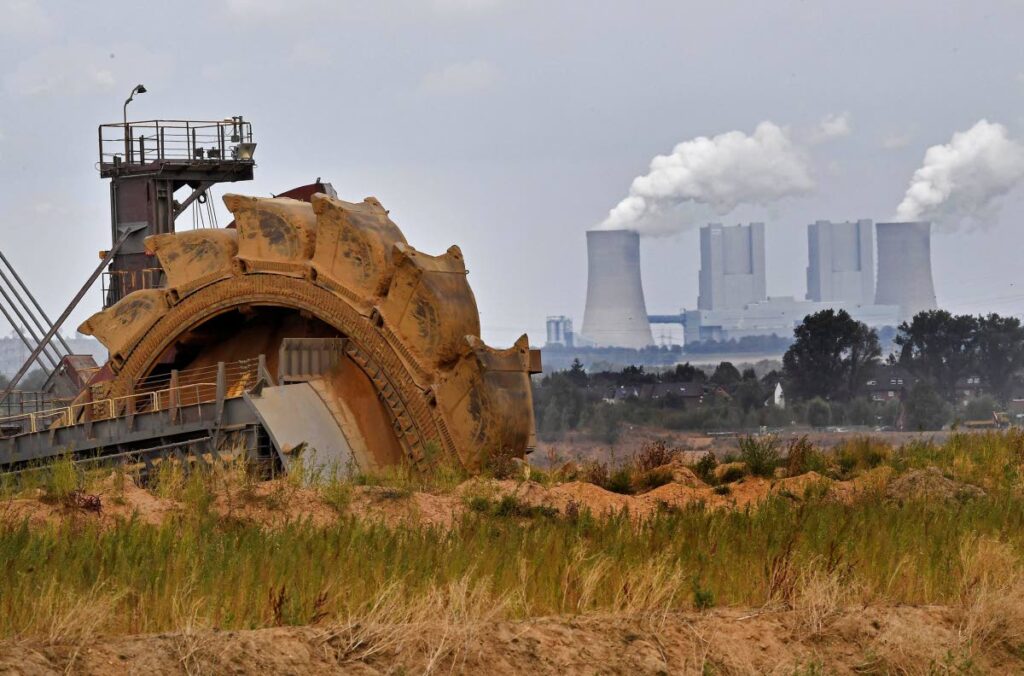Young knocks developed states on return to coal energy sources

At the Suriname Energy, Oil and Gas Summit at the end of June, a fiery Minister of Energy and Energy Industries Stuart Young encouraged unity among Caricom, South American and African states which had hydrocarbons, and knocked “developed” states, particularly in Europe, for preaching energy transition, yet running to the worst form of hydrocarbon – coal – at the first sign of shortages in its energy supply.
Quoting from an article from the Journal of Petroleum Technology written in January, Young explained that France was expected to increase its limits on coal usage as its power plants undergo maintenance.
“The developed world, when they face an energy crisis rush to coal – the worst hydrocarbon fuel. But they want to come down on us and put pressure on developing nations who have hydrocarbon resources and tell us about de-carbonisation, sustainability and what we must do as we try to develop.”
“Anyone who attended COP26 last year, would have seen, ironically, on the way to Glasgow, all of the wind turbines at a standstill. Renewable energy wasn’t giving them sufficient supply in Europe. Immediately they restart coal plants that were about to be decommissioned.”
“The conversation changed with the crisis in Russia and Ukraine.”
At the summit, launched to connect hydrocarbon producers with strategically minded companies looking to capitalise on investment, development, and project opportunities in Caricom, Latin America and Africa, Young called on new regional players in the energy industries to look out for “carpetbaggers”, and others who had the world to say about energy transition in the region.
But how fair is the minister’s position? Is Europe’s energy crisis, fuelled by conflicts, shortfalls and strikes, really pushing it back to the dark days of burning coal?
A coal front
The BP Statistical Review of World Energy indicated that coal consumption increased by six per cent to 160 exajoules (EJ) in 2021. One exajoule is equivalent to around 23 million tonnes (mt). China and India accounted for 70 per cent of the growth in coal demand, increasing by 3.7 and 2.7 EJ respectively, but Europe and North America increased coal consumption after nearly a decade of declines.
The result is that coal consumption rose to levels higher than it was in 2019 and the highest since 2014.
Global production mirrored consumption with an increase of 440 mt.
The review indicated that although renewable energy continued trending upwards to 13 per cent in 2021, coal remains as it has been for the past two decades as holding the largest share in consumption for the purpose of power generation. The share of coal in power generation increased from 35 per cent to 36 per cent. However, it remains lower than it did in 2019. Gas remained close to its 10-year average, at 23 per cent of the share of power generation.

In his summary, chief economist Spencer Dale said challenges and uncertainties facing the energy sector are at its highest in 50 years. He said despite strides in sovereign states, carbon emissions, with coal being one of the main contributors, has risen every year since the 2015 Paris Agreement.
However, coal consumption in the EU has been reduced by a quarter in 31 years, going from just under 400 mt in 1990 to around 140 mt in 2020. Production went from 227 mt in 1990 to 57.2 mt in 2021. The EU has asserted that two thirds of coal-fired power plants must cease operations by 2030.
Coal accounts for 15 per cent of the EU’s energy production, according to the 2021 Energy Industry review, with 53,000 people working in thermal power plants, and 185,000 people in mines. Energy magazine Euractiv reported March 2021 that French power utility EDF said half of Europe’s 324 coal-fuelled power plants were either closed or announced a retirement date before 2030. These mines are expected to be replaced by nuclear power plants, and power plants that use renewable sources and even natural gas.
Winter is coming
Europe’s reduction in coal consumption has been consistent up until February 2022, when Russia invaded Ukraine, and the conflict which followed triggered an energy crisis in the EU.
Sanctions on Russia resulting from the war in Ukraine led to Russia responding by limiting its flow of natural gas to the EU. Russia supplies the EU with 40 per cent of its natural gas supply. This means that, despite the EU’s drive to get rid of coal, it is now backtracking, especially for the coming winter months.
The Washington Post indicated last month that countries such as Austria, Germany, Italy and the Netherlands announced plans this week to prepare to reignite old coal plants days after Moscow reduced natural gas flows to several member states of the EU.
In Germany, Vice Chancellor and Minister of Economic Affairs and Climate Action, Robert Habeck who is also a high-ranking member of the Alliance 90/The Greens – a political party that put climate policy at the center of its agenda – also announced that government is getting retired coal plants back online.
But this is a reluctant move to replenish gas stores which, Habeck said, is at about 56 per cent.
In Austria, state controlled energy utility Verbund got orders to restart the Mellach coal-fired power plant which was retired in 2020.
In Norway, industrial strikes as well as a reduced flow of natural gas from Russia to Europe through the Nord Stream 1 pipeline and a 10-day shut-down is making an already tight gas market even tighter.
Young to EU: Fix your house first
Young, in his statement at the Suriname summit, called on European states to fix their own energy affairs before lecturing the region least responsible for climate change.
“Fix your home first; do what you have to do first before you come to lecture us. We will listen, but do not underestimate the power that we have together,” he said.
Young once again stamped TT’s energy policy as being pro-natural gas, especially during a critical period of transition to renewable energy. With new-found petrochemical resources in Guyana, potential resources in Barbados and a wealth of resources in Africa, Young said now is the time for developing countries to band together and hold the same position.
“We have been fortunate enough to find hydrocarbon resources,” he said “Now is the time for us to band together and do what we need to do in a responsible way.”
Young expressed TT’s commitment to working with Caricom, in particular Guyana, Suriname, and other provinces with hydrocarbon resources. He also extended that invitation to African and Latin American states, offering assistance in developing energy sources and providing energy security in a safe and clean manner.


Comments
"Young knocks developed states on return to coal energy sources"